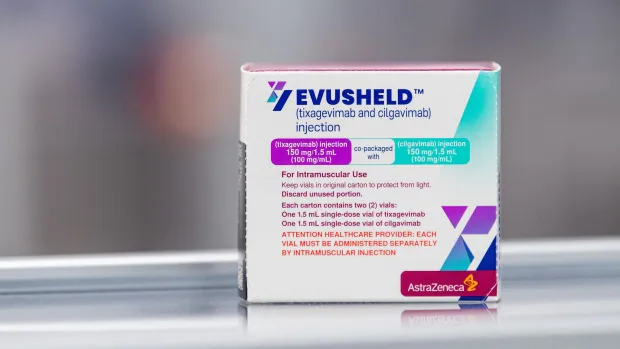Canada on Thursday authorized British drugmaker AstraZeneca Plc’s antibody-based therapy for preventing COVID-19 infections, giving itself another weapon against the disease as cases rise in the country.
Health Canada has cleared the drug — Evusheld — for use in individuals aged 12 years and older who are immunocompromised and unlikely to mount an adequate immune response to COVID-19 vaccination, or for whom COVID-19 vaccination is not recommended.
While vaccines rely on an intact immune system to develop targeted antibodies and infection-fighting cells, Evusheld contains the lab-made antibodies tixagevimab and cilgavimab, which are designed to linger in the body for months to contain the virus in case of an infection.
A health-care professional administers each antibody through an injection, usually in the buttocks.
Side effects for up to one in 10 recipients are said to potentially include a rash, pain or itching at the site of injection, with a much smaller number of people potentially experiencing headaches, chills or soreness after receiving the shots.
The relaxing of COVID-19 restrictions is a big concern for some people who are immunocompromised or otherwise at high risk. 2:07
Health Canada said in a statement on Thursday that there is not yet enough data to be sure that Evusheld is safe for use in those pregnant or breastfeeding, so those individuals are advised to discuss the potential benefits and risks with a health-care professional.
The therapy has already been authorized in the United States and its use has also been recommended by the European Medicines Agency.
Citing studies from Israel and the United States, AstraZeneca said in a statement Thursday that immunocompromised individuals can be at risk of hospitalization from breakthrough COVID infections.
“The key to ending the COVID-19 pandemic is protecting as many people as possible against infection, including those who may need an additional layer of protection to prevent COVID-19 than vaccines alone can provide. We welcome today’s approval as an important step along this journey,” said said Kiersten Combs, president of AstraZeneca Canada.
An estimated 14 per cent of Canadians aged 15 years or older have a compromised immune system that increases their risk of adverse outcomes from COVID-19, according to a Statistics Canada survey series from 2020.
Protection against BA.2, Health Canada says
Evusheld was tested against the BA.1, BA.1.1 and BA.2 subvariants of Omicron in a recent study from Washington University in the U.S., a study that was not peer reviewed.
Data from the study showed the therapy reduced the amount of virus detected in samples, the viral load, of all tested Omicron subvariants in mice lungs, AstraZeneca said. It was also shown in the study to limit inflammation in the lungs, a critical symptom in severe COVID-19 infections.
“Evusheld is expected to retain neutralizing activity against Omicron subvariant BA.2, which is now the dominant variant in many communities in Canada,” Health Canada said in its statement Thursday.
With respect to humans, Evusheld was found to cut the risk of developing symptomatic COVID-19 by 77 per cent in trials that took place largely before Omicron hit, Britain’s drug regulator said last month. Protection lasted for at least six months after a single dose, Britain’s Medicines and Healthcare products Regulatory Agency (MHRA) said.
The MHRA said that the treatment should not be administered to people infected with the COVID-causing SARS-CoV-2 virus, or those who have had recent exposure to someone with the virus.
Omicron’s properties have seen it evade vaccine protection to a greater degree than previous variants, as well as blunt some monoclonal antibody treatments that had been utilized for some patients, such as casirivimab/imdevimab and sotrovimab.
AstraZeneca announced in February it had struck a deal with the federal government to supply 100,000 doses of Evusheld to be delivered in 2022, pending its approval in Canada.
AstraZeneca’s partnership with Oxford University led to one of the earliest approved COVID-19 vaccines. While a rare clotting issue found in some vaccine recipients led many Western countries, including Canada, to de-emphasize its use, the vaccine has been given to just under three million Canadians and 67 million people globally, according to data from Health Canada and tracking by Our World in Data, respectively.


